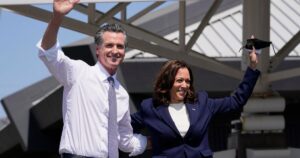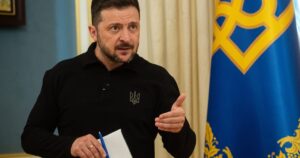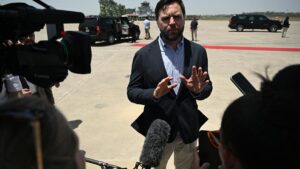US President Donald Trump on Wednesday played up prospects of a “fair deal” on trade with China, but his top officials offered few details of how Washington might de-escalate its damaging tariff war with Beijing.
Trump told reporters his country would have a “fair deal with China,” adding that “everything’s active” when asked if Washington was talking to Beijing.
But how soon the tariffs can be lowered “depends on them,” Trump said, referring to Beijing, even as he maintained that he gets along “very well” with Chinese President Xi Jinping and hopes they can reach an agreement.
Trade tensions between the world’s two biggest economies have soared as Trump ramped up levies on imports from China this year, imposing an additional 145 percent tariff on many products over practices Washington has deemed unfair, and other issues.
Beijing in turn has countered with new 125 percent tariffs on US goods.
Despite signals that Washington is looking towards a fair agreement, the state of discussions remains murky.
Asked if there is direct US contact with China on trade, Trump said: “Every day.”
But earlier Wednesday, US Treasury Secretary Scott Bessent told reporters that the two countries are “not yet” talking when it comes to lowering tariffs.
“I think both sides are waiting to speak to the other,” he said at an event on the sidelines of the International Monetary Fund and World Bank’s spring meetings in Washington.
He added that there is no unilateral offer from Trump to slash duties on Chinese goods.
US Treasury Secretary Scott Bessent said that Washington has not initiated discussions with Beijing regarding tariffs, clarifying that President Donald Trump has not extended any independent proposal to reduce duties on Chinese imports.
During a forum in Washington, Bessent noted that both nations appear to be awaiting the other’s initiative. This statement followed the White House’s previous day’s positive assessment regarding a potential trade agreement with China.
According to Bessent, negotiations can only proceed after both nations reduce their substantial tariffs on each other’s merchandise.
He expressed his belief that the present tariff rates are unsustainable for both countries, suggesting the likelihood of a mutual reduction.
Since January, the Trump administration has implemented an additional 145 percent tariff on numerous Chinese goods, whilst Beijing has retaliated with 125 percent levies against Washington’s recent measures.
Bessent likened the situation to an embargo, stating that a trade severance between the two nations would not benefit either party.
He concluded by expressing optimism about the possibility of both sides reducing tensions.
Officials from India and the United States will commence discussions on the proposed bilateral trade agreement in Washington starting Wednesday, aiming to resolve outstanding issues and accelerate negotiations. The United States has indicated that the agreement with India would facilitate access to new markets for American products whilst generating opportunities for workers, farmers and entrepreneurs across both nations.
The United States Trade Representative has outlined objectives including enhanced market access, lower tariffs, reduction of non-tariff barriers, and negotiation of additional comprehensive commitments to ensure sustained advantages.
The United States has repeatedly expressed concerns regarding its growing trade deficit with India, which stands at USD 45.7 billion in 2024. Through the BTA, the US aims to address and reduce this trade imbalance with India.
Both nations have concluded the terms of reference (ToR) for the agreement.
Swedish heavy truck maker Volvo Group on Wednesday posted a 30-percent drop in net profit in the first quarter as vehicle sales fell by nine percent on uncertainty over trade tariffs.
“Recent tariffs and other trade restrictions imposed or considered to be imposed by the US and other countries have significantly increased uncertainty about trade conditions in markets where the Group is present, as well as in relation to global and regional supply chains,” Volvo Group said in a statement.
“The situation is fast-changing and complex to assess, and no predictions can be made on future developments, potential impacts on the Group or whether trade restrictions may impact the Group more severely than main competitors.”
Equity benchmark indices Sensex and Nifty surged in early trade on Wednesday driven by a sharp rally in global markets and foreign fund inflows. Buying in blue-chip IT stocks also added to investors’ optimism.
The 30-share BSE benchmark Sensex jumped 658.96 points to 80,254.55 in early trade. The NSE Nifty rallied 192.05 points to 24,359.30.
From the Sensex firms, HCL Tech surged over 6 per cent after the firm posted an 8.1 per cent increase in consolidated net profit at Rs 4,307 crore for March quarter 2024-25, mainly on account of large deals with a total contract value of about Rs 25,500 crore.
Donald Trump said Tuesday he had no intention of firing the chair of the US Federal Reserve and signalled a “substantial” lowering of tariffs on China — bringing relief to global markets spooked by his aggressive trade policies.
Trump’s recent outbursts against Fed boss Jerome Powell had fanned concern that he would oust him, sending jitters through markets.
The president had criticized Powell for warning that the White House’s sweeping tariffs policy would likely reignite inflation.
“I have no intention of firing him,” Trump said Tuesday. “I would like to see him be a little more active in terms of his idea to lower interest rates — it’s a perfect time to lower interest rates.
“If he doesn’t, is it the end? No.”
The Shanghai Auto Show, the world’s biggest automotive exhibition, commences Wednesday, highlighting the dominance of electric vehicles whilst international trade restrictions potentially affect China’s worldwide expansion plans.
The exhibition features approximately 1,000 participants, with international automotive manufacturers eager to demonstrate their capability to compete with Chinese companies, who currently lead the electric vehicle sector.
The Chinese domestic market has thrived due to government support for electric and hybrid vehicle development, with market analysts noting its appeal to younger consumers who embrace innovation.
China maintains its position as the largest automotive market globally, experiencing continued growth whilst other significant markets face declining sales.
According to a pre-show report by AlixPartners consultancy, “Domestic growth in China is being driven by rapid adoption of electric vehicles, increasingly with intelligent-vehicle features such as autonomous-driving systems.”
Bullion hit another record Tuesday while the dollar steadied and equities mostly fell as Donald Trump’s latest salvo against Federal Reserve boss Jerome Powell added fuel to fears about the central bank’s independence.
With the US tariff blitz still causing ructions on global trading floors, investors are now dealing with the added worry that the US president will try to remove the country’s top banker that many fear could hammer already fragile market confidence.
Trump took a swipe at Powell last week for his warning that the sweeping levies would likely reignite inflation, saying his “termination cannot come fast enough” and adding that “I’m not happy with him. I let him know it and if I want him out, he’ll be out of there real fast, believe me”.
While that raised eyebrows, the Republican tycoon sent shivers through markets Monday by calling on the Fed boss again to make pre-emptive cuts to interest rates and calling him a “major loser” and “Mr. Too Late”.
India and the US have finalised the terms of reference outlining the roadmap for negotiations of the proposed Bilateral Trade Agreement (BTA), according to a statement issued by the US. US Trade Representative (USTR) Jamieson Greer said that these ongoing talks will help achieve balance and reciprocity by opening new markets for American goods and addressing unfair practices that harm US workers.
“India’s constructive engagement so far has been welcomed, and I look forward to creating new opportunities for workers, farmers, and entrepreneurs in both countries,” he said in a statement.
“I am pleased to confirm that USTR and India’s Ministry of Commerce and Industry have finalised the Terms of Reference to lay down a roadmap for the negotiations on reciprocal trade,” Ambassador Greer said.
BJP MP Praveen Khandelwal on Tuesday emphasised the importance of US Vice President JD Vance’s visit to India, stating that his meeting with Prime Minister Narendra Modi will play a crucial role in strengthening trade relations between both nations.
Khandelwal noted that the visit was significant not only for enhancing trade ties but also for promoting India’s culture and heritage in the US and expressed hope that discussions would also focus on safeguarding India’s interests amidst the ongoing trade tariff war between the US and China.
“In the current global situation, the visit of the Vice President of America to India is very important. His meeting with Prime Minister Narendra Modi will strengthen the trade relations between India and America. Not just for trade but also for the spread of India’s culture and heritage across the US, this visit is important… I am hopeful that there will also be a discussion on how far India’s interests will be protected in the current trade tariff battle,” Khandelwal said.











